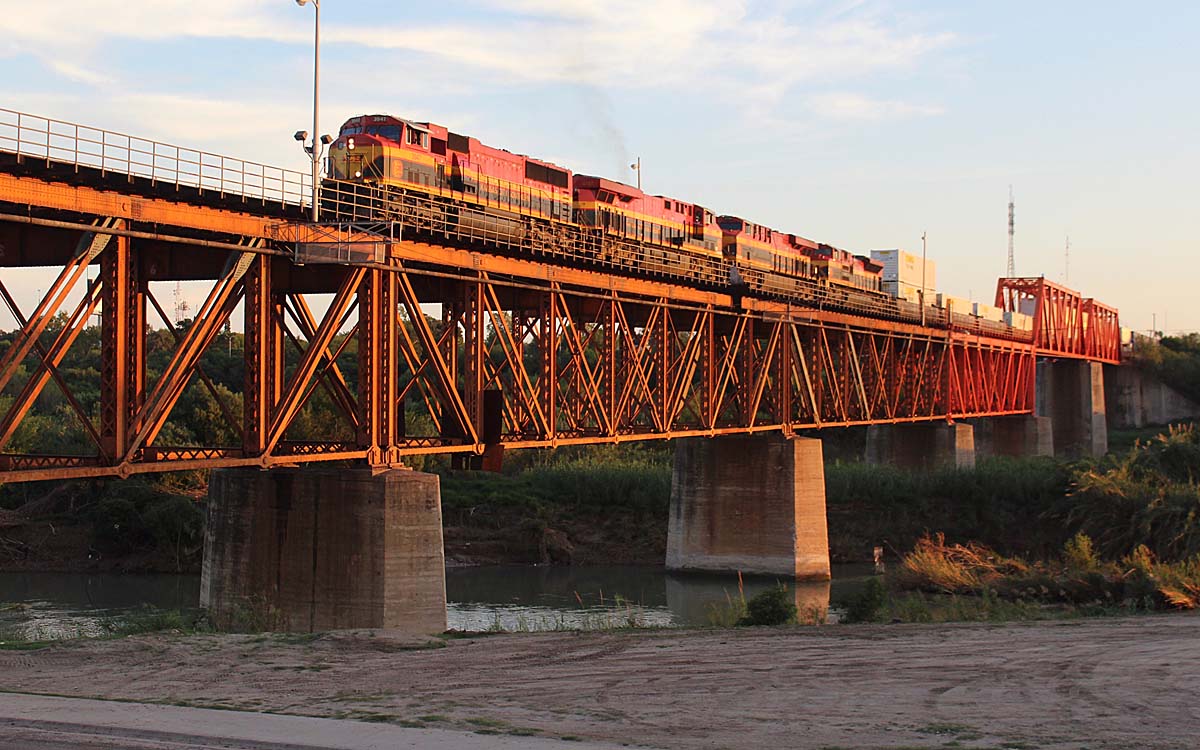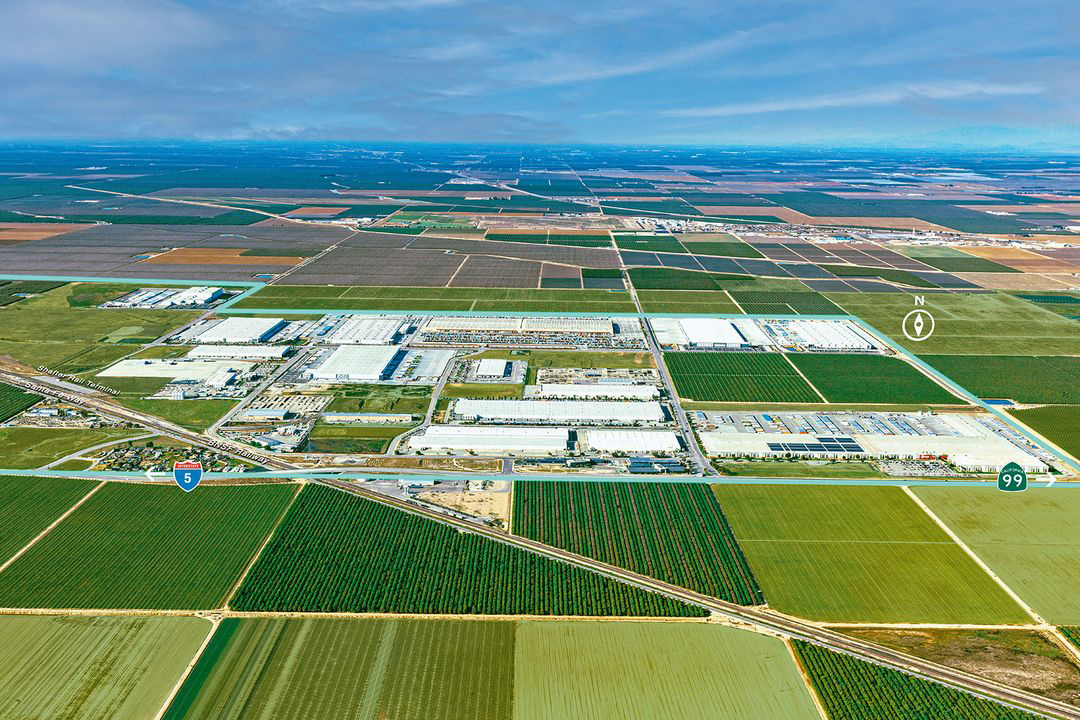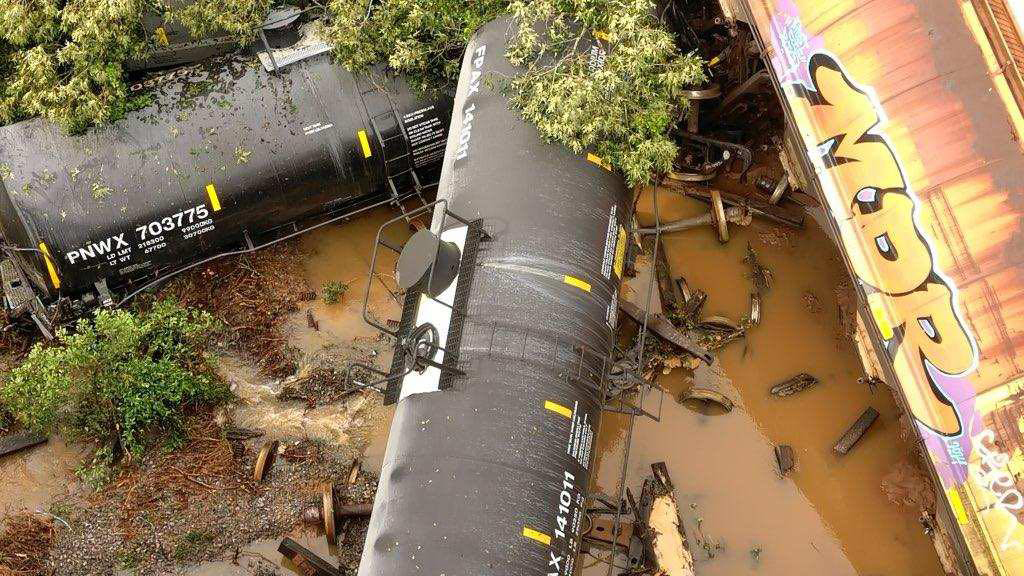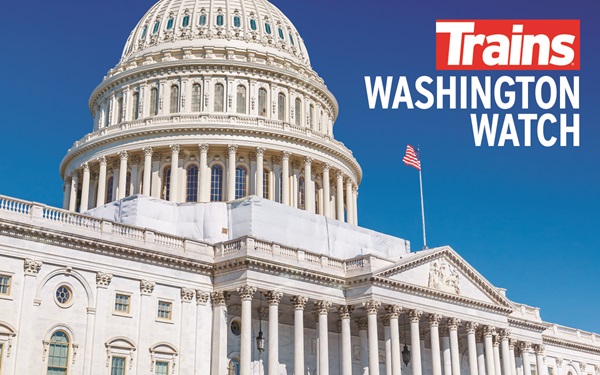
CHICAGO – Union Pacific is suing the Surface Transportation Board because the agency’s approval of the Canadian Pacific-Kansas City Southern merger didn’t fully protect cross-border competition at the Laredo, Texas, gateway or address the potential for congestion in Houston, UP CEO Lance Fritz told a shipper conference today.
“In their approval they identified our concerns were bona fide. We were concerned about commercial access into Mexico. And we were concerned about overwhelming the capacity in and around Houston,” Fritz says. “And they said ‘You’ve got a real point on both cases. But we’re not going to help you solve that.’ ”
Fritz praised the board for imposing an unprecedented seven-year oversight period on the merger, up from the traditional five years. But its remedy for competition concerns at Laredo is not up to the task, UP contends.
“Specifically what we were concerned about is in Mexico it’s possible for the CPKC to use Mexico market power to preclude reasonable commercial access by our customers either going into Mexico or Mexican customers distributing their products in the United States,” Fritz told the North American Rail Shippers conference.
UP currently handles about two-thirds of all rail traffic that moves between the U.S. and Mexico thanks to its access to all major gateways. CPKC controls the Laredo gateway, where it owns the International Railway Bridge across the Rio Grande and also operates CPKC de Mexico south of the border.
UP says CPKC should have to use a proportional mileage-based rate structure in Mexico, which would allow customers to gain transparency on rates and level the playing field. “I’ll compete all day long with them,” Fritz says. “All day long.”
Rather than impose a proportional rate condition on the merger, the STB’s remedy was to direct customers to bring any cross-border rate and access complaints to the board. “That strikes us piece by piece, and probably the damage is done by the time it gets worked out,” Fritz says.
CPKC has pledged to keep all gateways open on commercially reasonable terms, a promise that the STB made a condition of the merger.
UP also had told the STB that it had concerns that growth of CPKC traffic through the busy Houston terminal on UP trackage rights would lead to gridlock unless capacity expansion projects are put into place in advance. But the STB’s merger decision turned aside that issue, as well.
UP filed suit against the STB in federal court earlier this month, asking for a judicial review of the CP-KCS merger decision.













Houston has always been a crowded problem for SP and then UP. They have tried to clear it up with a new yard north west of Houston but killed it when that “new system PSR” of running trains was instituted. The new yard sits unfinished but with lots of track. Instead UP tries to cram everything it can thru Englewood Yard while staking trains in Houston , CPKC should investigate working with UP to finish that yard and change trackage rights to go with it. And, CPKC surely would have to build some track to do it. It would be worth it to abandon Houston.
Rather than crying to the judiciary for a review of the CPKC merger, perhaps Fritz should tend to his own knitting, and clean up his carrier’s own deep-seated service issues, rather than looking for an adjudicated out to address UP’s inability to compete.
Don’t be so obtuse… All the carriers do this. Concessions to ,ergers are the name of the game.
IT’s a competitive rate issue, who handles the traffic is secondary to the amount of traffic involved which does not increase just because of who’s running the trains.
I Thought Union Pacific Already Has Formed a Deal with Ferromex and Canadian National what More do they Want Just Sit Back and Relax Everything Is Going to be Okay
UP has a point. While CPKC is boasting about how much infrastructure they’re going to add to handle zillions of additional trains, one place they say doesn’t need it is Houston, where they’re only a tenant. Yet, they have their hand out for $54 million for upgrades for a second Amtrak train from Chicago/Rondout to St. Paul.
On the bright side, if CPKC ever has the blatant audacity to complain about how UP is handling their trains between Robstown and Beaumont, UP can simply say to them: “It can’t be a problem because you said existing infrastructure was adequate.”
Actually UP can gum up the works in Houston very easily. Most C-Pack trains will be thru trains which UP can easily track and estimate times thru Houston. UP just schedule arrival and departures just before the arrivals of C-Pack trains there by gumming up the whole Houston area. Then easily blame C-Pack as the cause.
Alan said, “Actually UP can gum up the works in Houston very easily. Most C-Pack trains will be thru trains which UP can easily track and estimate times thru Houston.”
Well, yeah! CPKC is on UP for 90 miles from Beaumont on the east side of Houston and on UP for 129 of the 219 miles from Robstown on the west side of Houston. They are totally going to know where the competition’s trains are.
The bottom line is: It is illogical to route traffic from Laredo to the Upper Midwest through Houston for a variety of reasons.
“I’ll compete all day long with them,” Fritz says. “All day long.” but then says he wants a “level playing field”.
Mr. Fritz, open thy wallet. Extend your sidings in Houston so your (yes.. UP consists) tail ends aren’t blocking through traffic of “any” operator with rights in your territory.
Or build your own bridge and connection and exchange with Ferromex a few miles south of Laredo to “protect your customers”.
CP and KCS took the risk to merge, so if you want to compete, open they wallet and compete and take your own risks.
Or meet with CPKC and do a deal-deal. You want a level playing field, then horse trade with them to get the field you want. Maybe there is something CPKC really needs and you can help them get it. But to compete by crying in the court of ones convienience doesn’t sound like competition.
“Or build your own bridge and connection and exchange with Ferromex a few miles south of Laredo to “protect your customers.”
I guess “few” can be subjective.
But objectively, the mileage is about 160 miles, near Monterrey.
Yes, I almost typed “Monterrey” instead . But I get it, “few” is subjective and I should have been more specific. But the point is still made. UP can compete if they choose too. Class 1’s have gotten a little too cooperative in sharing track to the point they use it to obstruct new services.
Actually that is not completely true. The railroads would prefer to not share ANY track with the competition but the STB listens and parcels out trackage rights as they deem fit. Except in this case they chose to not guarantee reasonable rates to cross the bride at Laredo.
CPkc will do as expected and either raise rates or delays trains or wait the seven years and then drop the hammer on competition. Its as sure as the CP beaver logo….
Mr Saunders, I don’t think the STB forced UP to take on KCS in Texas. KCS asked UP for trackage rights becuase KCS couldn’t afford to upgrade several 1880’s era bridges at the time.
If I was UP I would be irritated about this becuase a merged CPKC could have dealt with those deficient bridges pretty quickly. UP could have put a “change of control” clause in the trackage rights agreement so in the event of a merger or buyout of KCS, it would force a re-negotiation to take place.
But I can only speculate that UP considered KCS a weak operator and that no one would want them, so the short term revenue looked really good.
Hey if the data shows CPKC is abusing their rights agreement, then I will be the first in line to tell CPKC, go build your own way home. You are big enough now, go open your wallet.
“Yes, I almost typed “Monterrey” instead”
So you really expect UP (or Ferromex) to construct 160 miles of new railroad from Nuevo Laredo to Monterrey?
That’s not the problem with the route anyway. A route to Monterrey only gets the customer base there (in theory); their main operations center in that part of the country is well to the west in Torreon.
The Ferromex map at their website indicates trackage rights (on CPKC) south from Saltillo. I’m interested if anyone could elaborate on what that entails.
“So you really expect UP (or Ferromex) to construct 160 miles of new railroad from Nuevo Laredo to Monterrey?”
It was one example where UP could compete instead of going to court. In reality I expect UP to go and stay in court as long as it takes because that is how modern CEO’s view competition in a semi-regulated environment.
The black hole that is Houston is a real concern. How this is mitigated remains to be seen…with or without CPKC.
Wouldn’t a proportional mileage-based rate structure favor UP in most cases since UP has shorter routes between Mexico and the Upper Midwest?
I think that’s the point. From Laredo to Chicago, CPKC is 25% longer. And not all miles are equal. CPKC’s are slower, steeper, have inferior infrastructure, and no alternate routes.